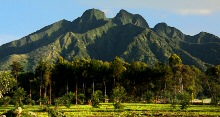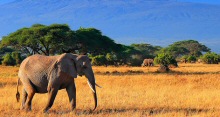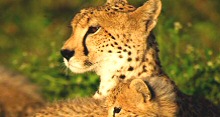After shaking off most of the negative perceptions that had stopped Uganda’s Tourism industry growth until the late 1990s, the sector has recovered considerably.
The Uganda tourism sector contributes 8% of Uganda’s GDP and is seen as one of the sectors with the most promising growth prospects, the government has often kept it on the back burner in its budgeting processes.
Budget estimates for 2010/11 show that the tourism ministry could suffer a budget cut of nearly 20% from that of the current financial year.
The encroachment on the tourism budget would perhaps not hurt the sector as much if it had not been preceded by encroachment on wildlife protected areas.
Mr Moses Mapesa, the executive director of Uganda Wildlife Authority (UWA), notes that encroachment and illegal access have often posed challenges to the management of such protected areas.
Between 2007 and 2008, the government allowed oil companies to carry out exploration activities in both Queen Elizabeth and Murchison Falls National Parks, while Hima Cement was granted a licence to mine cement at Dura in Queen Elizabeth National Park.
Although these companies are compelled to ensure that they do not extensively damage the parks, the intrusion of humans and machinery often destabilises the animals’ habitats eternally.
Mr Mapesa argues that such challenges facing conservation have compelled them to strike a balance between development and conservation –an activity that was often carried out with the help of donor funding. “The pressures exerted on conservation in Uganda generally call for a paradigm shift from conservation just for the sake of it and using conservation to promote development and poverty alleviation,” explains Mr Mapesa.
Last week, UWA, which got semi-autonomous status from the Tourism ministry, started the Uganda Wildlife Conservation Trust. It is expected to generate funds locally for conservation activities, especially as donor funding reduces. According to Imelda Bacudo, a conservation finance advisor at UWA, the Trust will have a rigorous business plan for each national park and wildlife reserve aimed at ensuring they operate at optimal performance. “Once you put the money in a Trust fund then it becomes independent and transparent and it is managed by very technical financial managers.
It makes you assured of financial continuity because it is being managed sensibly. Sometimes you cannot always rely on government subsidies or foreign grants so you have to look at several ways of capturing income and managing it sensibly,” she said.
UWA Spokesperson, Lillian Nsubuga, says while tourism revenue has gone up, most of it is from one activity; gorilla tracking. “Most of our parks bring in more than we put in,” she said. “The gorillas are actually helping to save other wildlife like hippos, elephants, impalas, zebras, gazelles, jaguars, cheetahs, etc.
Part of the earnings from gorillas support conservation of other species but we are moving towards a period of more equitable distribution.” While a semi-autonomous status has given UWA the room to try out new conservation and fund-generating ideas, other sub-sectors that are funded solely by the government seem bereft of creativity. According to the Commissioner for museums and monuments in the ministry of Trade, Tourism and Industry, Ms Rose Nkaale Mwanje, more than 500 cultural and natural tourist sites are endangered.
Ms Mwanje says sites like Wamala Tombs, Ntutsi Mounds and Nyero Rock Paintings are among those being destroyed due to lack of funds to maintain them, lack of appropriate laws, ignorance of locals neighbouring the sites and land encroachment.
Yet the rhetoric from the government does not promise much for sub-sectors still funded largely from state coffers, with the minister for Tourism, Trade and Industry, Mr Kahinda Otafiire, saying, “Government is committed to giving financial support to the tourism industry but the bread baske is still small and the priorities are many.”
BY Tanah Hadijah












